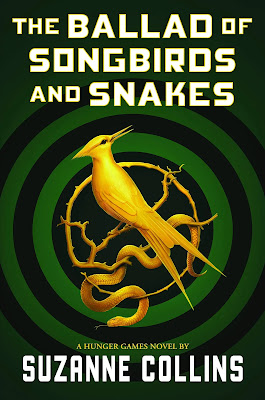On the surface, readers wouldn't think that there's a lot of space to expand on the world of Panem. After a trilogy of books, how could anyone make The Hunger Games exciting and new, especially without beloved protagonist Katniss centering the book? In a clever sidestep, Suzanne Collins has decided to do what anyone else would do in popular franchise culture: make a prequel. This one centers around antagonist Snow as a young man experiencing the bloodbath ritual for the first time. One has to ask how an unsympathetic lead makes a difference in this world and whether audiences would be willing to go along with it, but Collins knows what she's doing.
For as much as this is a world that doesn't necessarily encourage expansion, the additions provide a cleverness and depth that push the story into a complicated dilemma. By attempting to push beyond the nefarious behavior readers know, Collins successfully creates a sympathetic story that finds Snow able to be seen as likable, even understandable in his poor decisions. It's the type of chess game perfect for the battlefield. Every move is about survival and while Snow maybe had more advantages than half the characters in "The Ballad of Songbirds and Snakes," he's left with questions of keeping his soul and integrity alive. The reader knows how things evolve. Knowing how it starts brings to light the preventable in ways that make the larger series more tragic and preventable. While it's part of a familiar tradition of prequel world building, it's enough to please fans of Hunger Games as a larger universe.
One thing must be clear. A lot of the appeal of "The Hunger Games" series centered around Katniss. Her lower class status and workmanlike nature created someone who was sympathetic and easy to root for. Snow is, by comparison, a bit more sniveling and not as easy to engage with on the page. He's just as decisive and maneuvers between problems brilliantly, but he's not necessarily as thrilling. Maybe it's a byproduct of having some familiarity with better ideas in Collins' series, but he sees a more primitive version of concepts that will be later built into thrilling spetacle. Right now it's all fairly juvenile. Readers get to see how everything was born, and it's very simple compared to what's to come.
On some level it's still nauseuous to witness the birth of an evil pasttime. Seeing a society decide to dehumanize its citizens is terrible in most contexts. The way it's like gawking at reality TV in the early 2000s makes it more surreal and reveals a sense of not fully knowing what to expect. There's disbelief over what's to come while others turn it into a dissociative game that turns human life into chips on a poker table. Snow meanwhile, is a mentor to a young idealist who is akin to a grassroots activist singer, doing what she can to spread awareness of the corruption on display. While she may pale in comparison to Katniss, she's still someone who brings a panache and magnetism that keeps her from being a clone.
It's ultimately the relationship that Snow forms with her tht makes the story feel more essential. When he sees a world that's beyond the wealthy elite, it suggests the optimism among the downtrodden. It's a community that feels bonded in values. What exactly would joining The Capitol do to better their lives when it provides such misery? And yet, there's one move late in the story that captures Collins at her best. The downfall of Snow comes down to an act of trust that was ultimately haphazard. The slow build to that passage leaves a pit in the reader's stomach. Even if the romance feels truncated in the larger text, it does allow for this to land as something life changing.
More books have been promised in The Hunger Games series. Even if that wasn't true, this serves as a nice extension of the universe. For as much as the franchise hasn't made a character as enduring as Katniss, "The Ballad of Songbirds and Snakes" at least creates confidence in giving more supporting characters a shot to see corners of this world that haven't really been tapped into. It's one where there's as many difficult plays on the battlefield as there are in basic relationships. Everything is life or death in some way, and it's what Collins does very well. She asks what made Snow evil and, while a tad cliche, delivers something worthy of the pages it's printed on. While not the best in the series, it serves as reassurance that anything to follow is likely to be more than a dull cash grab.

No comments:
Post a Comment